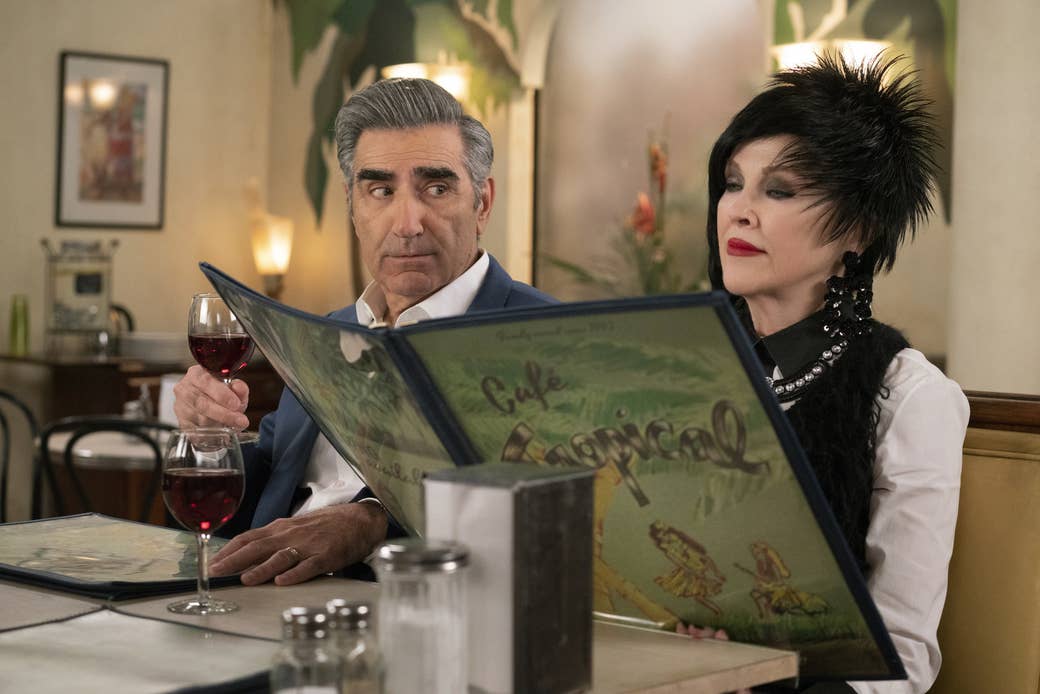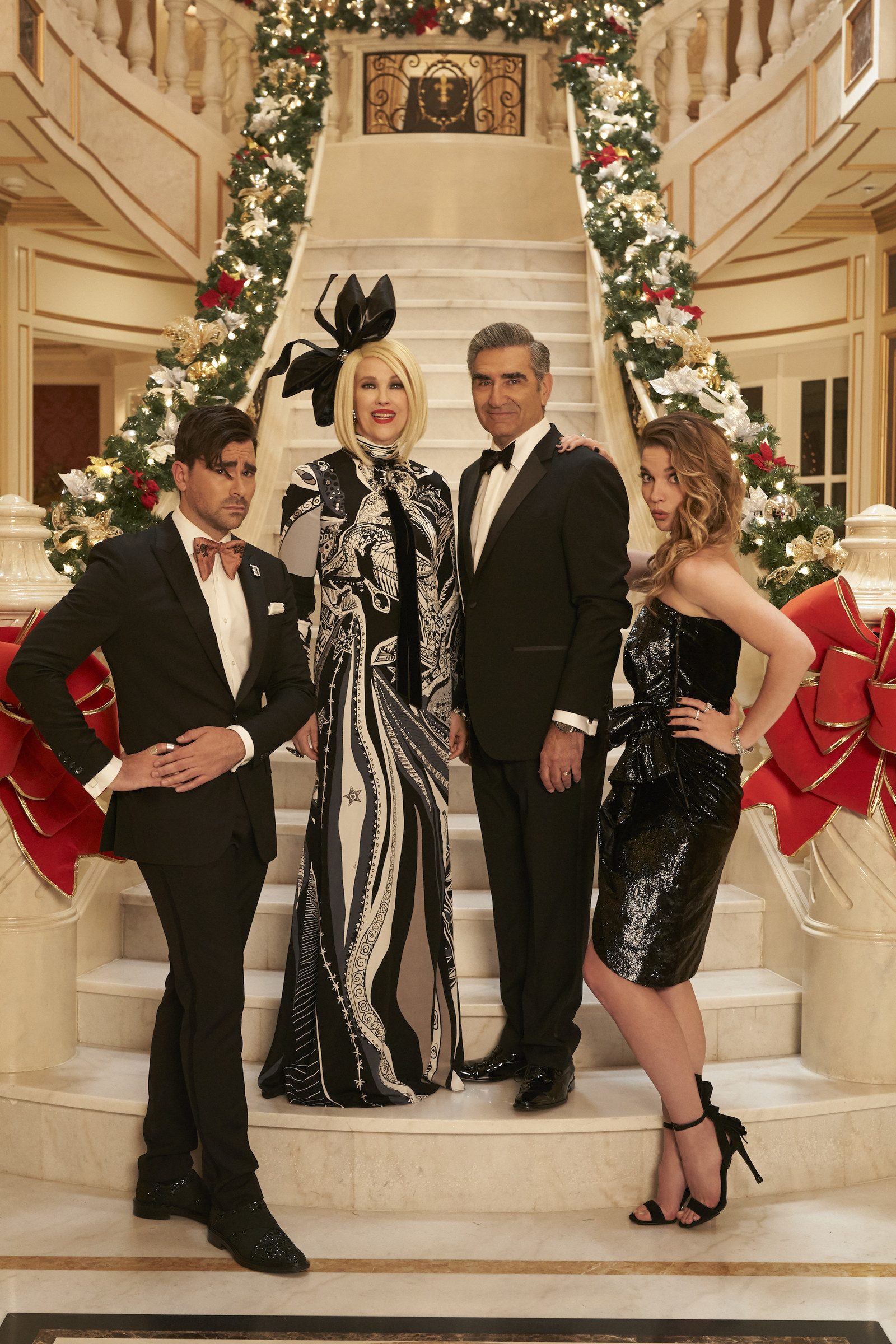
A young man in a ridiculous black-and-flames sweater is cringing. His boyfriend has decided to host an open mic night at the general store they run together in the small town of Schitt’s Creek. Moreover, his boyfriend has gone ahead and kicked off the night with a serenade. It’s clear David Rose (Daniel Levy) would rather die than bear the embarrassing saccharine gesture he’s about to witness. His mother Moira (Catherine O’Hara) is supportive though equally aghast. “You’ll let me know if I should pull the fire alarm?” she asks him. But then Patrick (Noah Reid) strums his guitar and begins a pared-down rendition of Tina Turner’s “The Best.” The moment is so sincere that you can see David, often blasé and sarcastic, a sardonic jet-setter in a previous life, fighting back the tears it elicits. He’s surprised by how moved he is. He’s out of quips and eyerolls to dole out. The show follows suit, offering no punchline to cut through the earnestness at hand.
That kind of sweet humor, the kind that pushes you to set aside whatever cynicism you may harbor and chuckle while smiling, is at the heart of Schitt’s Creek, the heartfelt Canadian sitcom that airs its fifth season premiere on Wednesday. Co-created by Levy and his father Eugene Levy (who also plays his father, Johnny Rose, on the show), the show has become a sleeper hit. It began with a laughable premise. In its pilot episode, Johnny, Moira, and their two kids, David and Alexis (Annie Murphy), learn that they’ve been defrauded. Their fortune is gone. The only asset they have left is the titular run-down town Johnny had once bought as a joke. Begrudgingly they move into a motel there and begin figuring out how to rebuild their lives with nary a cent to their name.
The show’s first seasons relished putting the Roses through increasingly ridiculous situations as they adapted to life in Schitt’s Creek. Moira, once a daytime soap opera star, becomes a spokesperson for a local fruit winery; Johnny, a former home video mogul, is forced to fraternize with the bumbling local mayor. David and Alexis have to come to terms with their ever-shrinking clothing budget (“I have no money and an empty purse from two seasons ago!” she whines) and get jobs and learn firsthand what it’s like to not have everything handed to them. But that fish-out-of-water storyline soon gave way to a much more interesting examination of what it means to be a family and to bridge relationships with others when wealth is quite literally out of the equation.
Over the show’s four seasons (and a holiday special that aired in December), this Canadian import has found the humor in the sunnier side of things, alongside newer shows — The Good Place, Unbreakable Kimmy Schmidt, One Day at a Time, and The Marvelous Mrs. Maisel to name but a few — that are earnest without being cloying or toothless. In a TV landscape once littered with brooding antiheroes, it’s a welcome change.
For the better part of the 21st century, sarcastic humor reigned supreme in television comedy. Shows like Arrested Development, 30 Rock, The Office, Curb Your Enthusiasm, and Veep put that kind of biting humor at the heart of their stories and characters. As the multi-camera sitcoms were going the way of the dinosaurs (Big Bang Theory ratings notwithstanding), these were thoroughly modern comedies, remaking what could be possible in half-hour network and cable shows.
If anything held them together it was that they — like the antiheroes who came to characterize the Golden Age of Television — centered on people you found hilarious in spite of (or, perhaps more appropriately, because of) their shortcomings. There was a built-in cynicism to premises and characters alike. There was the vapid privilege (and outright cluelessness) of the Bluth family that Arrested Development’s Michael (Jason Bateman, in full straight-man mode) could never quite rein in. There were the twinned and complementary wry wits of Liz Lemon and Jack Donaghy, which anchored the punchline-laden world of Tina Fey and Robert Carlock’s 30 Rock. And now there is the insult-laden vanity of Julia Louis-Dreyfus’s VP-turned-President Selina Meyer that serves as the gravitational force of HBO’s Veep.
These shows are earnest without being cloying or toothless. In a TV landscape once littered with brooding antiheroes, it’s a welcome change.
In many ways, the shows felt like the heirs apparent of the most quintessential ’90s sitcom: Seinfeld, above all, was a paean to neurotic, ironic assholes everywhere. And while the show’s most memorable moments always took place in between Jerry Seinfeld’s stand-up bits, the generation of sitcoms that followed took his signature gesture (that utter disbelief at other people’s insane behavior: “Can you believe this guy?” eyeroll and all) as their baseline sensibility. Sarcasm became a way to nudge audiences into seeing how laughable the world around them was, where sincerity and naivete were implausible if not outright obsolete. Moments of earnestness on these post-Seinfeld shows were constantly undercut by sharp punchlines, visual gags, cutaway shots, or meta narratives — the Ron Howard voiceover in Arrested Development, the mockumentary format of The Office — they all helped to frame the stories in ways that mirrored but broke through the laugh track effect of sitcoms of an earlier era. Irony ruled supreme.
Such humor has always served a purpose, particularly in politically uncertain times. When Obama was elected president, Joan Didion and Darryl Pinckney bemoaned the loss of irony in the culture at large. The necessary cynicism in the public discourse that had felt all so urgent in the Bush era, the implication went, was now being replaced by the hopeful rhetoric of Obama’s campaign. “Irony was now out. Naiveté, translated into ‘hope,’ was now in. Innocence, even when it looked like ignorance, was now prized,” they noted during a 2008 symposium at the New York Public Library later reprinted in the New York Review of Books. They may not have been talking about humor, but the implication that a new wave of earnestness was sure to make the posture of irony obsolete suggested that they prized such detached outlook above all else.
More than a decade later, as Veep in particular shows, irony is not dead. Nor is the probing cynicism that drives it and that allows us to mock and be horrified (often within the same scene) at the American political establishment. But there is a sense that comedies are also finding humor not in apathy but in sincerity. “All humor locates itself in social and political contexts,” writes Rebecca Krefting in All Joking Aside: American Humor and its Discontents, “but not all humor does so self-consciously or with specific intentions to promote unity and equality or to create a safe and accepting space for people from all walks of life.”

Schitt’s Creek, for example, feels like an experiment in how to inch away from such an arms-length sensibility. The Roses are, at first sight, quite ridiculous. Their lives, their costumes, their mannerisms, and affectations all demand that you think of them as caricatures. Take the matriarch of the family, Moira Rose. Not only does she have an entire wall dedicated to her wigs and dress in clothes that would turn heads even on a New York City runway (there’s no tiny hat, puffy headpiece, nor black-and-white patterned outfit she won’t over-adorn with clashing yet tasteful jewelry), but she has the most untraceable accent you could think of. In O’Hara’s fussy diction — best described as “drunken mid-Atlantic” — words like “baby” and “fruit wine” and “enchilada” get stretched out almost beyond recognition. On paper, this former soap opera actor is, like her husband and two children, an outrageously cartoonish creation. Johnny’s dry humor, David’s exasperation, and Alexis’s whines make the Roses teeter on the edge of absurdity.
In the show’s recent seasons, though, brushes with their past have made it even more apparent just how much the Roses have grown since they left their obscenely opulent house where the kids had their own wing (“I’m a light sleeper,” Moira explains in the new season; “That was an architectural mistake,” Johnny simultaneously states). Alexis’s recent run-in with an old friend of hers, donning a full Coachella-ready outfit and who’s touring “the most random cities in North America” (per a Vice listicle), made her see the life she leads anew. She may not be gallivanting in Capri with her ex-boyfriend Stavros, promoting her line of edible nail polish, or sharing pills from her mother’s medicine cabinet with friends in Kraków, but she’s found she’s perfectly content now.
Schitt’s Creek may have punchlines aplenty (and O’Hara remains unparalleled when it comes to doling out hilarious non sequitur lines), but it’s bingeworthy precisely because it feels like such a calming balm. Its wholesomeness is most welcome at a time when it would be (and is) all too easy to sink into apathetic despair. There’s a joy that runs through it that’s infectious, and which is symptomatic of a growing trend in recent comedies.
Its wholesomeness is most welcome at a time when it would be (and is) all too easy to sink into apathetic despair.
One need only look at the plucky heroes of shows like Unbreakable Kimmy Schmidt and The Marvelous Mrs. Maisel. Kimmy and Midge may exist in very different versions of New York City (the shows are set five decades apart), but both exude a sunniness that’s undeniable. The Jewish stand-up comedian who turned a drunken screed against her cheating husband into a budding career in comedy and the mole woman who’s intent on making the most of a world she was deprived of for 15 years both anchor shows that are fundamentally optimistic. In a recent interview with Vulture, creator Amy Sherman-Palladino shared that she’s often asked about whether it bothers her that Maisel is perceived as a “feel-good” comedy. “There’s an implication that, because the show has such a positive energy and our character is a joyous, bustle-through-life kind of gal, that there’s no depth,” she said, “and that unless a comedy makes you want to stick a shiv in your eye at the end, it’s not art.”
The positive energy that runs through Maisel is not that far off from other feel-good shows currently on. It’s there in the quartet of humans trying to become better people in NBC’s The Good Place, a quest as philosophical as it is funny; in One Day at a Time’s timely takes on the “Very Special Episode,” the one that makes us yearn for tight-knit families who’ll see us through anything; and even in the quaint and lovable small-town world of Schitt’s Creek. Rather than call on us to merely laugh at its characters, Levy’s show wants us to feel for them. Whether it’s David learning to let Patrick’s earnestness in (and, in turn, serenading him back with his own impassioned lip sync performance of Tina Turner’s song) or Moira involving herself in the community both as a member of the Jazzagals and as an elected member of Schitt’s Creek’s Town Council, Levy has anchored the show on a warm-hearted embrace of caring about those around us.
The lesson is unerringly simple, and quite politically charged, at a time when empathy seems to be in such short supply in the highest echelons of power. That such a sensibility could guide some of the best comedy being created in television right now sounds like a joke — only one we’re encouraged to be in on. ●
Manuel Betancourt is a New York City–based queer writer and a lapsed academic. He's a regular contributor to Remezcla, the film columnist at Electric Literature, and a monthly columnist at Catapult Magazine ("Movie-Made Gay"). He's one of the coauthors of the graphic novel The Cardboard Kingdom, a New York Times Summer 2018 Pick.
